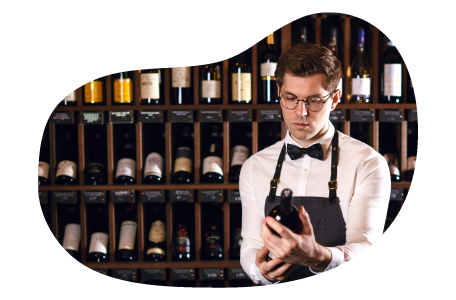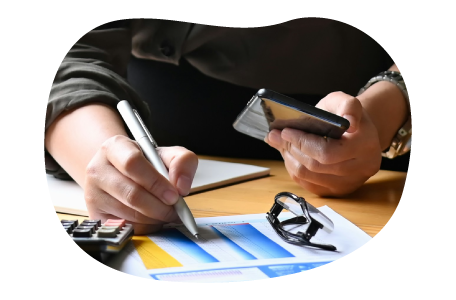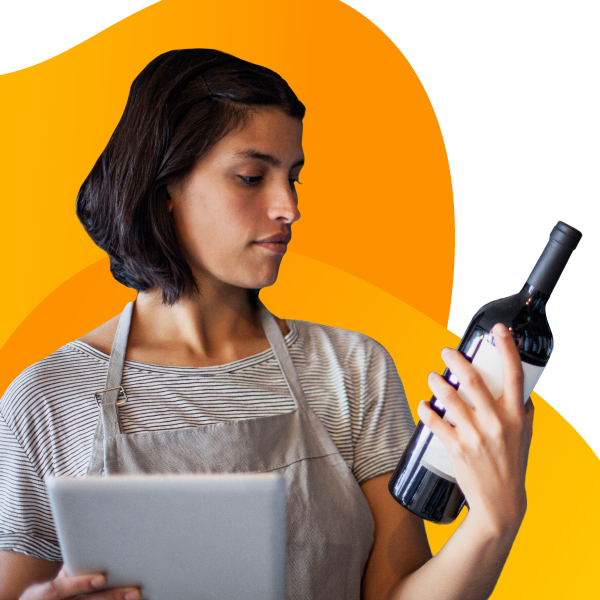

Why is insurance a must for liquor stores?
In states with dram shop laws, your store could be held liable for an intoxicated customer's destructive behavior. Business insurance covers legal costs, helps you comply with state laws, and pays for injuries and property damage.

Compare quotes from top insurance providers
With TechInsurance, liquor store owners can get quotes from the nation's leading insurance companies. A licensed agent will help you choose the best coverage for your business and its budget.
6 insurance policies every liquor store owner should consider
Business insurance helps beer, wine, and liquor stores recover quickly from accidents, lawsuits, and other common risks.
Business owner's policy
A business owner's policy, or BOP, is an inexpensive way for liquor store owners to buy general liability coverage and commercial property insurance together.
- Slip-and-fall injuries
- Business property damage and theft
- Business interruption coverage
General liability insurance
A general liability insurance policy defends liquor stores against third-party lawsuits, such as a customer who trips on a step and suffers an injury. It's often required for a commercial lease.
- Customer bodily injuries
- Accidental damage to a customer's property
- Advertising injuries, such as libel
Workers' comp insurance
Most states require liquor stores with employees to carry workers' compensation insurance. Personal health insurance won’t cover work-related injuries, which makes this policy crucial for sole proprietors too.
- Work-related medical bills
- Disability benefits
- Lawsuits from workplace injuries
Cyber insurance
This policy helps liquor shops recover from cyberattacks and data breaches that expose sensitive customer information. It's sometimes called cyber liability insurance or cybersecurity insurance.
- Data breach investigations
- Customer notification costs
- Fraud monitoring services
Commercial umbrella insurance
This policy covers expensive lawsuits that exceed the limits on a liquor store's general liability, commercial auto, or employer's liability insurance coverage. It activates when the underlying policy reaches its limit.
- Customer injuries
- Auto accidents
- Employee injuries
Commercial auto insurance
Almost every state requires commercial auto insurance for vehicles owned by a liquor store. It covers costs in the event of an accident involving a delivery truck or other company vehicle.
- Legal fees from an auto accident
- Vehicle vandalism
- Vehicle theft
Liquor store insurance costs

From our customer data, here's a quick look at average liquor store insurance costs:
General liability: $48 per month
Business owner's policy: $160 per month
Workers' compensation: $75 per month
Factors that can influence a retailer's insurance premiums include:
- Type of business, such as liquor store, brewery, convenience store, or grocery store
- Number of employees
- Value of your business property
- Revenue from liquor sales
- Types of insurance purchased
- Coverage limits and exclusions
- Claims history
Hear from business owners like you who purchased insurance coverage.
Why liquor store owners choose TechInsurance
Get insured quickly with TechInsurance
Get insurance fast so your liquor store can comply with state laws and other requirements. Fill out our easy online application, choose a policy, and pay online to start coverage today.

Common questions about business insurance for beer, wine, and liquor stores
Review answers to frequently asked questions about liquor store insurance and liquor liability insurance coverage.
Will insurance cover my liquor store if it's forced to close temporarily?
Yes, business interruption insurance covers financial losses from temporary closures. You can typically add this coverage to your commercial property insurance or business owner's policy.
This policy can help pay for day-to-day operating expenses and other related costs, such as:
- Employee wages
- Lost income
- Lease payments
- Relocation costs
The closure must be tied to a covered property claim, such as a fire or storm that damages your store. You might also see this policy called business income insurance.
Are liquor stores required to carry liquor liability insurance?
Yes, liquor stores and convenience stores often need to buy a liquor liability insurance policy to comply with laws and meet other requirements. For example, you might need this coverage to:
- Get a liquor license. In many states, liquor liability coverage is part of the requirements for a liquor license. For example, any business that sells or serves alcohol in Michigan, Connecticut, and Florida must carry this coverage, including liquor stores, wineries, caterers, and distributors.
- Rent a storefront. Your landlord might require you to carry liquor liability insurance to help ensure they're protected in the event of a lawsuit.
- Take out a loan. Lenders will want to know your business can withstand lawsuits and other incidents, so they might require you to buy this coverage or a general liability policy.
- Protect yourself against dram shop laws. Most states have dram shop laws, which hold businesses that sell or serve alcohol liable for damages caused by intoxicated customers. In these states, it's even more important to protect yourself against liquor liability claims.
Occasionally, you might see liquor liability insurance called dram shop insurance. Another term to know is host liquor liability insurance, a similar type of coverage for special events where alcohol is served.
Does liquor store insurance cover shoplifting?
Unfortunately, shoplifting is a common occurrence at liquor stores. In addition to security cameras and burglar alarms, it's important to protect yourself with the right insurance.
The following policies cover losses from shoplifting and other forms of theft:
- Commercial property insurance: Also called business hazard insurance, this policy compensates your business for stolen alcoholic beverages and other items. It also covers property damage from storms, fires, and vandalism. Get a discount on this coverage by bundling it with general liability coverage in a business owner's policy.
- Employee dishonesty coverage: An employee could steal from a cash register or conduct an illegal electronic transaction. You can add employee dishonesty coverage to a BOP to protect your business, or buy a fidelity bond that reimburses others for dishonest acts committed by your employees. In the case of a bond, the company that issued the bond must be paid back for the amount that was reimbursed.
What other insurance coverages do liquor stores need?
Liquor store owners should consider the following policies for their unique risks, which depend on the specifics of your business:
- Liquor liability insurance: Liquor liability insurance covers damages caused by intoxicated people who were served by your business, and may be required by the laws in your state. However, it can't protect against the consequences of selling alcohol to minors.
- Equipment breakdown coverage: This insurance covers losses related to the sudden breakdown of machinery or equipment, such as a broken air conditioner that discourages customers from shopping in your liquor store during a heat wave.
- Electronic data processing (EDP) insurance: This policy helps you recover financially from the loss of important data due to a power surge or other incident that damages computers or other electronics.
- Employment practices liability insurance (EPLI): If an employee files a lawsuit over wrongful termination, discrimination, or another violation of their rights, this policy will help pay for your legal costs.
- Hired and non-owned auto insurance (HNOA): This policy provides liability coverage for personal, rented, and leased vehicles used for business purposes. Personal auto insurance policies don't cover work-related driving, which is why you may need additional protection.








